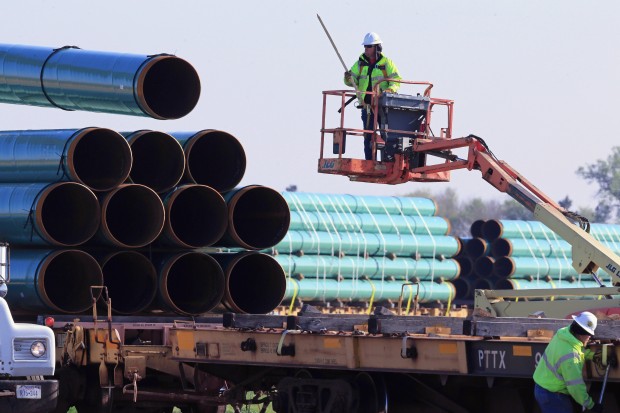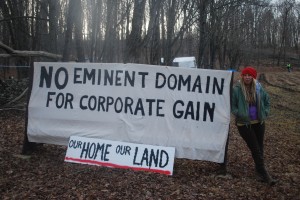Philadelphia's shale boosters want more pipelines

Nati Harnik / AP Photo
Workers unload pipes at a staging area in Worthing, S.D., for the 1,130-mile Dakota Access Pipeline that would stretch from the Bakken oil fields in North Dakota through South Dakota and Iowa to a hub in Illinois.
The Philadelphia Energy Action Team, a group of business interests organized as part of the Greater Philadelphia Chamber of Commerce, says the key to turning the city into an energy hub is getting more pipes in the ground. The group released their report on revitalizing the city’s economy using shale gas Wednesday morning. A goal of the effort is to double the amount of natural gas and natural gas liquids used in the tri-state region each year from the current 3 billion cubic feet a day.
The 60-page report, “A Pipeline for Growth,” is a detailed look at how the Delaware Valley, which includes Southeast Pennsylvania, northern Delaware, and South Jersey, can capitalize on the abundance of Marcellus Shale gas, including methane, ethane, butane, and propane.
“What the Energy Action Team is, is a civic coalition,” Action Team chair Phil Rinaldi told StateImpact. “It is not a commercial entity. It’s not building a pipeline or a factory. It’s trying to build the kind of political impetus for getting that done.”
The first step would be to get the gas to the region, which has an abundance of infrastructure including a number of ports along a newly deepened Delaware River.
“What we’re trying to do in concept is take that Marcellus where you have reserves that you measure in centuries, and just basically move that reserve here,” he said.
The report outlines a number of challenges, most importantly, the lack of current pipeline infrastructure to get the gas across the state. Rinaldi, who along with being the Action Team’s chair runs the largest refinery on the East Coast, Philadelphia Energy Solutions, says the report is meant as a guidebook to help promote the energy hub among local and state officials.
“So that hopefully the army that’s out there trying to develop this becomes not just a small focused army but a much larger army,” he said.
Rinaldi says the race is on to get the gas to Philadelphia instead of more traditional energy hubs like Houston.
“No other state has this kind of potential for a major change in economic capability,” he said. “The reserves in Marcellus and Utica are enormous and they’re trapped there because the market doesn’t exist to take those molecules away at a reasonable price.”
But with greater pipeline capacity, Rinaldi says prices and production will rebound.
“Once you’ve achieved that, you have an enormous amount of that gas flowing and that’s wealth that’s flowing. And when wealth flows there’s lots of ways to participate in that,” he said. Some of that flow could end up powering energy-hungry factories producing goods like aluminum, fertilizer, paper and glass, according to the report. Natural gas liquids like ethane are used as the raw ingredients for plastics. The first Marcellus Shale ethane exports left Philadelphia’s port for Europe last week. Rinaldi says the state could benefit through greater tax revenue. Pipelines are not taxed in Pennsylvania as they are in neighboring states like New Jersey. An analysis by Econsult, included as part of the report, estimates 10,000 new direct and indirect jobs could be created. The report also calls for small-scale liquified natural gas facilities, which could supply vehicles in place of diesel, or be shipped to the Carribbean.

Jon Hurdle / StateImpact PA
Megan Holleran stands by a sign on her family's land. The Hollerans lost their court battle to save their maple trees from eminent domain seizure. The trees are being cut to make way for the new Constitution Pipeline.
Rinaldi says there’s about 20 potential projects waiting for access to the cheaper fuel. He says his own company, Philadelphia Energy Solutions, has plans for a new co-generation power plant run on natural gas, but has yet to secure the gas supply in order to move forward with the plant.
Current pipeline construction has already run up against opposition across Pennsylvania. Sunoco’s Mariner East 2 is now tied up in court battles over eminent domain. And a coalition of Philadelphia area environmental groups, Green Justice Philly, formed specifically to oppose the energy hub.
Clean Air Council executive director Joe Minott says alternative energy like solar and wind should be pursued, not more fossil fuels.
“If you want to create jobs in Philadelphia,” said Minott, “you’re going to create a lot more jobs through energy efficiency, through solar roofs, through alternative energy.”
Minott calls the energy hub plan a “big slap in the face” to former Mayor Michael Nutter’s plan to make Philadelphia a green city.
“This is not a vision that most Philadelphians are going to buy into,” said Minott. “This is not a vision that most people who live in the Philadelphia area will buy into. So I think Mr. Rinaldi is just not in touch with what Philadelphians want.”
















